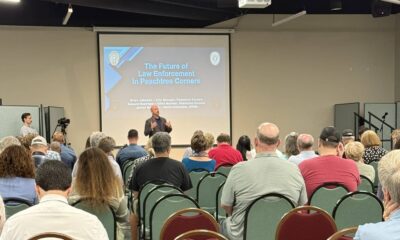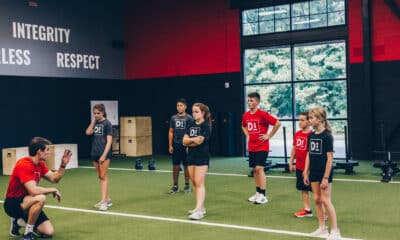Business
The New Multi-Use Development, Townhouses & Cornerstone Academy
Published
4 years agoon
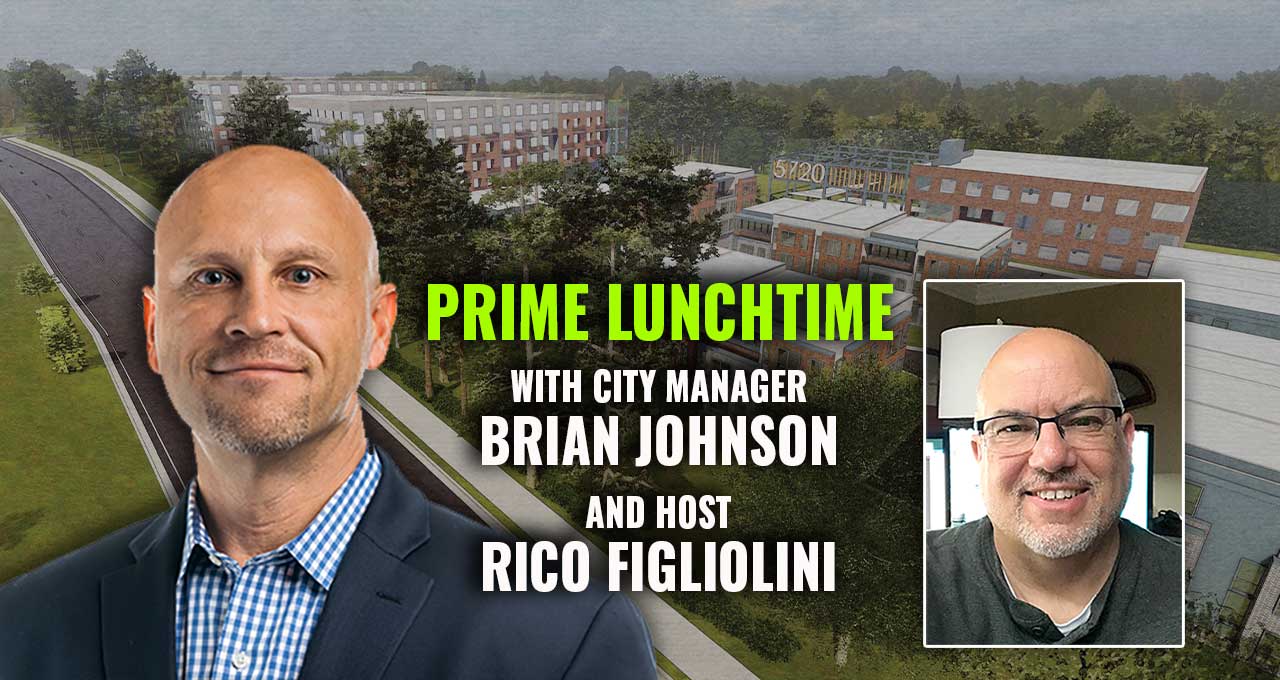
On this Month’s Prime Lunchtime with the City Manager, Brian Johnson
Learn about the new proposed 9.2 acre Peachtree Parkway multi-use development, new townhome application for at Peachtree Corners Circle and Jay Bird Alley, and Cornerstone Academy’s expansion plans.
Timestamp, where to find it in the podcast:
[00:00:30] – Intro
[00:02:14] – Cornerstone Expansion
[00:08:08] – Townhouse Rezoning
[00:12:38] – 9.25 Acre Multi-use Zoning
[00:24:06] – Low Emissions Grant
[00:28:59] – Closing
“This is the first application of the very first of our mixed use development ordinance. The developers have taken advantage of it. And we believe to the betterment of the entire project… it does have certain incentives within that ordinance that we all win.”
Brian Johnson
Rico: [00:00:30] Hi everyone. This is Rico Figliolini. Thanks for joining us for Prime Lunchtime
with the City Manager, we’re going to be discussing three major things that just happened this
past city council meeting. One of them was voted on two of them we’ve done what’s called a first
read and consideration. So there’ll be coming up in the next council meeting. But we’re going to
be covering the cornerstone Christian Academy application for a change of variance. A change
of conditions for their property and expansion of the private school. Also, we’re going to be
discussing the town home rezoning of from our R102 Townhouse that’s happening at Jaybird
Alley and Peachtree Corner Circle that may happen. And also we’re going to discuss a rezoning
application for 9.25 acres along Peachtree Parkway that’s looking to become a multi-use
development. Before we get to that, I just want to say thank you to Hargray Fiber for being a
great sponsor of not only this podcast, but the family of podcasts that we do in supporting
Peachtree Corners Magazine. They are a company here in the Southeast that provides internet
capabilities to small companies, as well as enterprise businesses. Along with the tools, office
tools that you can use to run your business better. Fast internet service. Not like the cable guy.
They’re also a great supporter of Curiosity Lab in the city of Peachtree Corners. They’re really
local and they provide a lot of community support. So check them out. Hargray fiber is the
company. HargrayFiber.com is where you can see them. So before we go any further, let me
bring on of course my guest Brian Johnson, City Manager. Brian, thanks for being with us. What
we’re going to be discussing is a bunch of different things. I’m acting as engineer right now. So
bear with me.
Brian: [00:02:12] No worries.
Rico: [00:02:14] We do this all the time, but there we are. All right, cool. So I know that things
have been crazy going on in the city and stuff, lots of new things going on. I won’t even get into
one of the things we discussed pre-show a little bit which has been in the AJC. And that’ll be a
separate video that I’d like to discuss with some people and talking about what’s going on. And
the horrendous thing that deals with that I cannot believe a government official is allowed to do
essentially. So I’m just going to vent on that on a separate video from this. But let’s dig a little
deep into what is going on in the city. And some of the things, some really good things and
some things on that have taken advantage of the new multi-use ordinance and such. So the first
thing on the agenda for today, is just a quick discussion of Cornerstone Christian Academy, the
private school here in the city of Peachtree Corners. One of the best schools out there. They
just got the best, company for best place to work I think from the AJC that we just covered in our
website. And which is, you know, not easy to get from what I understand. So it’s a great, great
thing for them. So tell us a little bit Brian about, what the application was for, and I’m going to
slide some images on as we talked about it, or at least one.
Brian: [00:03:28] Well, you know Cornerstone, well Peachtree Corners as a community, as a
municipality, we’re very blessed. We have a number of great school options within the city,
Cornerstone being one of them. We’ve got a great public school system offering. We’ve got
Wesleyan and we’ve got Cornerstone. And so it’s, I think sometimes as a community, we
overlook the fact that if you live here, you’ve got some pretty, you got some great options and
those options allow you to keep your world as small as possible. So you don’t, your commutetimes are shorter and your quality of life increases. If you’ve got kids that are active, you can
keep them close to home. And it’s nice. So cornerstone is one of those great options. They have
been doing well. Their enrollment has been such that they’ve been able to, with that and some
fundraising, look at creating a more permanent campus from what they started. They started by
acquiring a commercial office building and expanded from that into multiple buildings. That were
assembled in parcels that were contiguous. So they’ve got a mini campus.
Rico: [00:04:42] In Technology Park.
Brian: [00:04:44] Right. And what they’ve done is when you’ve got these, this assemblage of
buildings that were originally constructed as just standalone office, commercial office, they want
their campus to actually start feeling like a real campus versus just an assemblage of
commercial office buildings. So they are taking one of the buildings and they’re demoing the
building and creating a quad in the middle of other ones. And they’re also expanding that, or I’ll
call it joining that, with adjacent property that is across the street from Peachtree Corners
Baptist church.
Rico: [00:05:29] Now, for the people that don’t know. They, and I don’t have a slide
unfortunately, I thought I did. That’s the property, the parking lot across from the church, that
also has the athletic fields and a little pavilion area on the side.
Brian: [00:05:42] And so Cornerstone has acquired it. They, I guess just have use rights for a
while from PCBC and so they’ve acquired it. So now they’re just creating that campus and that
kind of locks in that part of it. They’re going to continue to use it in the way that it was when they
were just using the property and not owning it. So it’ll still be used for recreational purposes.
There’ll be some parking there, there is a little bit of, there’s plans for a gymnasium on the
property. And then a little, I guess you call it, a clubhouse associated with the ball fields. And so
they have some expansion plans for the property, but it’ll still be used in the way that it has been
so far. We’re excited to you know, have a school here that has done well enough enrollments
such that they can put deeper roots into the community than they had before and expand and
make this educational offering that much more, enticing than it was before this plan came out.
Rico: [00:06:46] Yeah, I’m excited for it. I’ve seen Cornerstone start from a really small school. I
think it was actually within Peachtree Corners Baptist originally. Yeah, I think so. And then they
got the one office building, then they expanded to two. And I think, I guess now it’s three. So it’s
exciting to see that. And if I remember correctly from the plan, the proposed plan, is that the ball
fields would probably stay where they are, the baseball field. The soccer field will probably be
reoriented a little bit. And then that gymnasium is going to be, if you’re facing the property, that
gymnasium building is going to be on the left side of the property. These have taken up probably
two or three rows of parking spaces along that side. Away from residential, obviously there’s
you know, that. And close to the street side of Peachtree Corner circle. They have a great
school. I don’t think there was any opposition to that. I can’t imagine to that request.Brian: [00:07:46] No, there wasn’t. Especially when they’re using it for the same purpose,
everybody has accepted that it’s a recreational use. It’s associated with the church and other
areas too. It’s a known commodity. Yeah, from the city’s perspective, we were very happy to see
their plans and we’re glad that we were able to help facilitate them getting this and moving it
forward.
Rico: [00:08:08] Yeah. I’m excited about it and we’ll be covering that a little bit in the next issue,
not this issue, but the June-July issue of the magazine, Peachtree Corners. We’re going to have
a little profile about, a little story about that. And maybe possibly some of the renderings of
what’s going to be, what’s planned for that. Let’s go on to the townhouse rezoning or the
rezoning of a property at the corner of Peachtree Corner Circle on 3755 Jaybird alley. From
R100 large residential land plot, right? To townhomes. I’m going to slide this on, tell us a little bit
about this. And there was opposition to this. I’ve got to say there were probably 239 in
opposition to this. I don’t know of how many people showing up at the city council meeting, but
there was quite a bit opposition, I think, singed in letters and such. So tell us a bit about this
rezoning.
Brian: [00:08:57] Well, I mean, you know, this is typically what you get when you get a developer
who comes in and is looking to maybe take property, assemble some parcels or take something
that already exists and oftentimes redevelop into something else. This one is one of those
purposes you’re looking at. The easiest way is just to put a townhome community on it. I will say
at this point, that it was just the first read. And so council, there was no discussion. The
discussion and vote will be at the April council meeting. They did have, the developer did have
multiple appearances in front of the planning commission prior to getting to this point. It was
tabled for some inner, for some further interaction with local residents that had some concerns,
at least once. And I know there have been some changes to it. But while this has been going
on, I can attest to, because I’ve pretty much been receiving the same thing, is the local
community there is very interested in this project. And has been expressing things of concern or
at least things that council needs to take into consideration when this is being discussed. So
there is a lot of interest from the community on this project. And mayor and council have
received all of the communication. It’s been organized in a way that, we know how much and
what they’re saying and what are the key points that are being brought up and council is
prepared to discuss it from an educated perspective. Both from what staff provides counsel and
what the community provides. So I look forward to them debating this and, you know, making an
up, down vote on it.
Rico: [00:10:44] Right. What actually butts this development on the other side of this? Not the
roadside, but the other side.
Brian: [00:10:53] It’s a triangle piece. I mean, I guess there’s a subdivision on the other side of
Jaybird Alley from this. A single family, detached residential community. There are at least, I
think two individual, single family homes that are in this triangle piece of property that are, I
guess it’s, what is it? Jaybird, Spalding and Peachtree Corner Circle. I believe is the three roadsthat form the kind of parcel that they’re looking at, or some of it. Now there’s a, yeah, those are
the three.
Rico: [00:11:31] So it butts up to residential, that’s actually probably R100 I’d imagine. So that
would on the face of it to me, I know you may not be able to say anything on it yet. Since
planning commission, did they, did the planning commission actually give a recommendation?
Brian: [00:11:47] They did. Did they recommended denial.
Rico: [00:11:49] Okay. Which makes sense to me, cause by taking a townhouse butting up to
one R100 is just such a drastic change. Usually it’d be like, let’s say R60 maybe or moving,
slightly higher and not going that far up in density next to an R100. That doesn’t make sense.
Brian: [00:12:09] You are right. That is one of the probably most common concerns raised by the
residents, is the increase in density that this would allow in the area where there’s not really the
same level of density. And council has received that message loud and clear and has not
dismissed this lightly. They’re prepared to, they’re probably to a point on this that they would
have, could have voted Tuesday night. It’s just, it was just the first read, so.
Rico: [00:12:38] Sure, sure. Alright. Then the next item that we’re going to talk about is the 9.25
acres along Peachtree Corners Parkway. There’s a request for zoning and this makes sense.
Because we’ve been discussing in the last few meetings, podcasts, about the multi-use
ordinance and the changes that happen in the ordinance. And this is actually being affected by
that ordinance. Their application, from what I could tell is taking full advantage of the credits that
they could get for high density and all that stuff. They have a laundry list of things that they’re
doing that help them compile their density. And it’s, these are basically office buildings. This is
basically Technology Park. The, on that side.
Brian: [00:13:25] Yeah. So this is on Peachtree Parkway. It is just North of the new signal at
Engineering Drive in Peachtree Parkway. Where the racetrack and the liquor store are. The
immediate building to the North of that. It’s a three story building that sits off from the road,
existing commercial office building. And then it’s that parcel and then it’s the parcel or maybe
parcels, but all of those single story, commercial condos, those old ones. There was a physical
therapist and life insurance, and it’s all of those and that existing one, the existing commercial
office building. So that’s the, just under 10 acres or essentially 10 acres. And it’s, you know,
what you see is this is an example as you’re showing here. This is the first application of the
very first of our mixed use development ordinance. Like you just said, the developers have
taken advantage of it. And we believe to the betterment of the entire project. And by that I mean,
given communication that’s been happening prior to this officially being submitted and some
changes since then, the project has actually got less units than the applicant originally
requested. Mixed-use development ordinance steered them down a road that ultimately resulted
in less density. And then it does have certain incentives within that ordinance that we all win.
They’re donating land for green space, there’s adaptive reuse of existing office buildings. They
are going to demo in that photo right there, those single story. And that’s what it looks like now.And if you go to the next one, that’s what it will look like. The couple of things of note. And I don’t
know, do you have any of the other ones? So that’s the single…
Rico: [00:15:33] Yeah. Let me pop one of the other ones.
Brian: [00:15:36] God knows how that will look. And then you have the, there’s the existing three
story office building set back off the road back there. And they’re keeping that and they’re, that’s
not the view. That’s a different, do you have any more? There’s another view.
Rico: [00:15:53] I think I do have this other view here. Hold on. There’s this.
Brian: [00:16:00] That’s on the inside. That’s the interior. I may have had, been privy to a view
you didn’t get. But anyway, that office building is going to be kept. That one right there is going
to be kept.
Rico: [00:16:11] Now, that’s a 1982 building built, I guess. That’s what I understand.
Brian: [00:16:17] Okay. And they’re going to be basically gutting it, reusing it in a number of
ways. Including some similar to like we-work space type of thing. Some of that will be, there’ll
be some amenities for the local residents in there. Clubhouse amenities type of thing. And I
think there’s, and then I think they have templated a coffee shop to go in there.
Rico: [00:16:43] So when they’re talking retail, so this is another view. I think this is the some of
the, I’m not sure if those are the townhouses. I think those are.
Brian: [00:16:52] They are.
Rico: [00:16:53] There’s going to be 26 planned townhouses, 295 multifamily apartments
essentially. And when they say, so they’re going to reuse the three story building, like you said.
Which was a 1982 buildings, so it’s fairly old building. So that makes sense. It’s I guess recall,
gutted out their building, not recalled, what was it? Brightree. And rebuilt there. It’s a beautiful
building by the way now.
Brian: [00:17:16] And they’re doing something similar to that. So the good thing here is there’s a
couple things of note. One is we have an adaptive reuse of an empty building, a building that’s
been empty for five years. And it’s also going to remove those single story office condos, which
if you’ve been back there, they are in a very degraded condition. In fact, most of them were
completely empty as well. The only ones, you know, we never noticed it if you’re driving by
because the front units still had some tenants in it. But man when you went back, it was empty.
People were breaking in. It was, it needs help. So that’s good. Second thing is all the trees
along Peachtree Parkway are remaining. And at the end of the project, there will be more trees
because of the replantings then they started with. And they also are reducing the impervious
surface that’s on the site. So when you get into the existing, all the existing parking lot and
rooftop. And when they remove all that and construct anew, there will actually be lesspavement when the project is done then there currently is. So those are some good aspects of
this project that we’re excited about.
Rico: [00:18:41] With the project you mentioned, obviously there’s, we’re talking about, it says
partial, some retail. Are they, is it just the coffee shop or is it?
Brian: [00:18:52] I’m not sure exactly. I’m not sure they even know at this point. Because again,
the way these things work. And there’s still a few things, a few little details that are even being
discussed, that will probably tweak the final version that council is voting on. And again,
planning commission serves a great, extremely important role here. And that is, they are the
best vetting tool that the city has of getting a project as close to possible as the project that
council wants to approve. Sometimes it’s impossible to get there and council, again, denies the
application. But sometimes, I would maybe even say a majority of the time, planning
commission is able to influence the developers at their stage in a way that then the developers.
Continue to make modifications to their site as a way to enhance the product before council
votes on it, which makes it easier for council to make a decision. Again, sometimes it’s just a
bridge too far and they can’t come to that. But anyway, there’s a little bit there, but on the retail
side, you can’t fill it. You can’t know exactly because they don’t have the zoning approved yet.
Rico: [00:20:19] But don’t they have to give you a plan to say, we’re going to have 10,000
square feet of retail.
Brian: [00:20:24] Yeah. And they do. I just don’t know that off the top of my head. They do,
because mixed use development ordinance has to have three different uses in it. And so they
are going to, their application does have square footage. I’m just saying that right now, before
council that number’s probably changing as we speak right now because the developer is
hearing some feedback and making modifications. But there will be a square footage dedicated
to retail, and here it will be depicted on where it will be. Some to commercial and some to
residential. And if the rezoning is approved, then of course they go out and they try to lock up
some leases. And those uses could be anything from a coffee shop to a sit down restaurant, a
dry cleaner.
Rico: [00:21:14] And it makes sense to me, obviously multi-use is going to be like that. It just
doesn’t make sense to me if there’s only one little 2,500 square foot coffee shop, and we’re
calling this development a multi-use development. When in fact that’s just like the minimal part
of it, right?
Brian: [00:21:31] It is. I mean, of course all projects have to have a minimal. So sometimes, you
don’t get as much as you want. Now we’ll say that the balancing act here on a mixed use
development on just anything, but on this one in particular, is to try to achieve a balance that’s
achievable. By that I mean, It would be great if there was a bunch of retail. Maybe we, you and I
are like, man I would love to have like a little mini shopping area or whatever. That’d be great.
Just for purposes of illustrating this. If we wanted it, that’d be great. But if the developer can’t fill
it, nothing would be worse than for there to be a development that started off with too manysquare feet of retail than they can fill. And that has happened. And so there’s also sometimes
you have to be careful about making somebody try to fit a square peg into a round hole. If the
timing’s not right, if the area’s not right. And retail’s the one that’s the most difficult right now
because retail nationally, internationally is undergoing a unique metamorphosis with the
Amazon’s of the world. So we don’t know where it will be. And so bricks and mortar retail is
scary sometimes to developers if you have too much.
Rico: [00:22:55] And the good part about this though, is that it’s not like they have an anchor
place. That’s 30,000 square feet of retail. So small shops, coffee shops, a couple of small
restaurants, I can see that. Especially if they’re bringing, the whole idea is bringing in over 300
families essentially into there. Whereas the town center doesn’t even have that yet. The
apartments where, the apartment and the Indigo hotel, where the original component of this and
who knows where that is right now. Because that’s still not being talked about. Because that was
almost 300 apartments or 260 apartments I think that would sit right over town center and that’s
not there yet. Which could probably help the retail, the restaurants and stuff like that. The whole
idea of that energy. Energized environment of people just being, I’m going down to get
something for breakfast and, just like you would in the city. In Atlanta, let’s say or Brookhaven. I
did want to ask about this. So the office building in the back, that’s not being converted to this.
This is a whole new building though that would be on there. This five story residential building.
Brian: [00:23:58] That’s a whole new building. That’s correct.
Rico: [00:24:00] Okay. And that would be set back. And the front part would be townhouses or
any of the retail?
Brian: [00:24:05] That’s correct.
Rico: [00:24:06] Alright. Cool. Great. So we’ve covered that a little bit and we’ve got a little bit
more time. So I thought maybe we’d just quickly talk about the, you guys did a resolution to do a
matching grant. Thought that was a great idea that had to deal with EVA, low emissions. Do you
want to talk a little bit about, give a couple of minutes on that?
Brian: [00:24:27] Yeah. So, just to step back real quick. The city, when it comes to economic
development has seen some really good success with Curiosity Lab being the magnet to attract
companies here. And we’ve seen it with Brightree and ASHRAE and some others. We’re seeing
it with some other activity within our innovation center that maybe is only temporary, but it is still
active. And so we have realized though that for us to continue to innovate, for us to continue to
keep market share of being, one of the only, if not only living laboratory of our kind in really the
world. We’ve got to keep doing things to stay out front. And what we’re seeing is, we’re starting
to compete with cities that are way outside our weight class. And the only way we can compete
with cities, like Jacksonville, Florida, just within their own general fund appropriated, I think it
was like $25 million towards autonomous vehicle research and testing on a location of the city.
They’re doing things. And Miami’s thrown, tens of millions of dollars of things. And those are, we
can’t compete with that directly. So what we’ve decided to do was we decided to be moreaggressive at identifying and going after grants. Because that’s the one way that if we are more
aggressive at trying to find and go after them, that’s one way for us to ultimately punch outside
our weight class. Above it is to have other people give us some money to be able to compete
with that. So we have started that process and we’ve gotten some consultants to help us identify
some grants. And we just happen to have one that we identified. It’s a low emission electric
vehicle research and development grant. That has a due date of April 12th. And so we weren’t
going to have another council meeting before then. And the reason council needed to be
involved is it’s a federal grant and the federal government generally wants to see a resolution of
support from the local jurisdiction so that they don’t, what has happened in the past, award a
grant to a community that ultimately, maybe doesn’t support having it. Maybe mayor and council
didn’t want to go after it and staff did, and then you get it and there’s not the community support.
So they’re looking for some measure of proof that the community would support something like
this to make it worth while, and to make sure that they’re appropriating it to communities, that
this would be a big deal. And clearly we think we have a competitive one with our electric
vehicle charging hub, the second largest in Georgia. Largest in Metro Atlanta. The solar
roadway, electric vehicle, or the autonomous vehicle activity we have. And we are looking to get
some more soon, all autonomous vehicles or electric vehicles. And then with partnership with
Georgia power and testing, what electric vehicles do to the power grid. And all that stuff feeds
into the very reason that we had Curiosity Lab and it feeds into economic development, which is
about activity. And activity is what we want here because activity of people, however temporary,
they feed our local economy. Because they’re either eating in our restaurants and are staying in
our hotels, renting office space, renting apartments, and some cases moving here permanently.
And so this grant would help us over a two year period, we would use the grant to get five
autonomous vehicles, which would be electric vehicles here from three different companies. And
those three companies would come out here and in coordination with Georgia power do testing
on the burden to the power grid, interaction with each other, maybe testing of charging in the
roadway. All sorts of things like that, but with all those things come support personnel. They
come technicians, they come with their own partners, other people who want to come out here.
Our resolution of support would be, we will support it monetarily or otherwise if we get awarded
the grant. So that’s why there was a resolution.
Rico: [00:28:59] Cool. Exciting stuff that’s happening in the city between development and EVA
and Curiosity Lab. I think people should be excited that the city is moving the way it is. You guys
are doing a great job. I think that’s it really. We’ve, we could go on and on I’m sure. I don’t want
to keep you too long. Brian, I do appreciate you coming out, helping explain some of these
important issues and things going on in the city. Thank you. I appreciate you being with us.
Brian: [00:29:25] Thanks for letting you know, creating this communication vehicle for us to get
some information out.
Rico: [00:29:30] Sure. So we’ve been listening to Brian Johnson, City Manager of Peachtree
Corners. Listen up for more podcasts coming out. And we have, we’re going to be doing a
podcast soon on the Wesleyan Artists Market, going from a real artist’s market to virtual. That’ll
be coming up next week. Actually, depending on when you’re listening to this. But thank you forjoining us. And again, I want to thank Hargray Fiber for being a sponsor of this podcast, as well
as the family of podcasts and the magazine. Check out Peachtree Corners Magazine in another
week or two, and you will see lots of stuff. Our biggest issue yet. See you then
Related
Business
Peachtree Corners Grows Business Opportunities Through Economic Development
Published
1 week agoon
May 6, 2025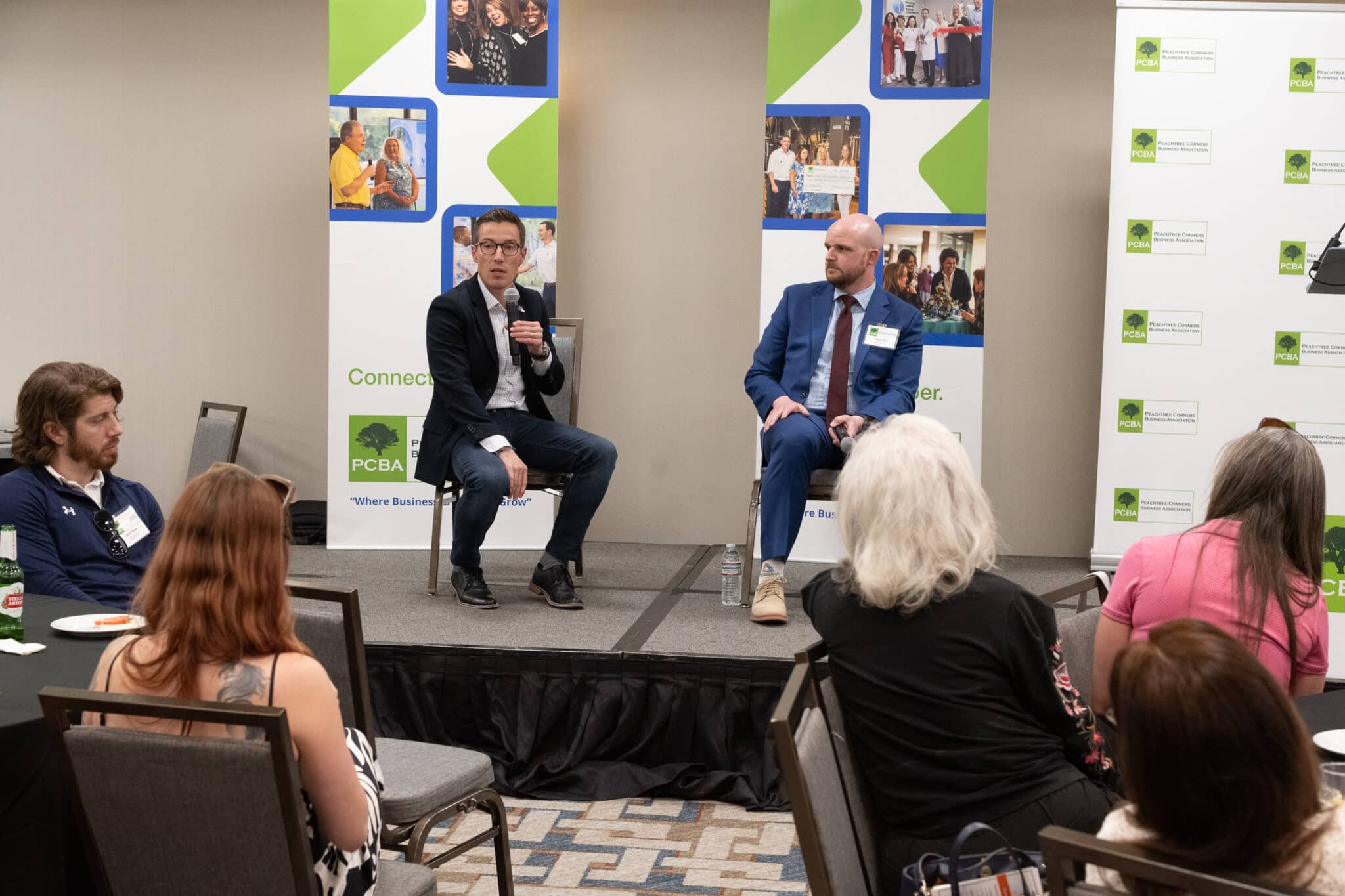
Most residents and business owners in Peachtree Corners probably think they know all about the economic development and strategic planning of Peachtree Corners, but do they really?
Peachtree Corners Business Association invited Peachtree Corners Economic Development Director Betrand Lapoire and Partnership Gwinnett Director of Economic Development Andrew Hickey to its After Hours Speaker Series on March 27 to discuss the city’s growth from a 1971 master plan to a bustling city with 42,000 inhabitants and 40,000 jobs.
Key points included the importance of business retention and expansion, with 24 projects last year creating 1,600 retained jobs, 1,600 new jobs and $250 million in new capital investment.
The Curiosity Lab, a world-class innovation center, was emphasized as a significant attraction. The city’s zoning and infrastructure plans were also discussed, focusing on balancing office and residential development to maintain a vibrant, sustainable community.
Matching jobs to residents
Although Peachtree Corners is just a teenager in terms of being an incorporated city, the foundation for this vibrant, fast-paced economic hub was laid more than 50 years ago by technology pioneer Paul Duke.
“Peachtree Corners was the first master-planned, business innovation technology park in metro Atlanta,” said Lapoire. “It was in response to the brain drain of technology with Georgia Tech graduates leaving the area.”
While the city may have a small-town feel, it’s the largest in Gwinnett County by population, but not land mass, he added.
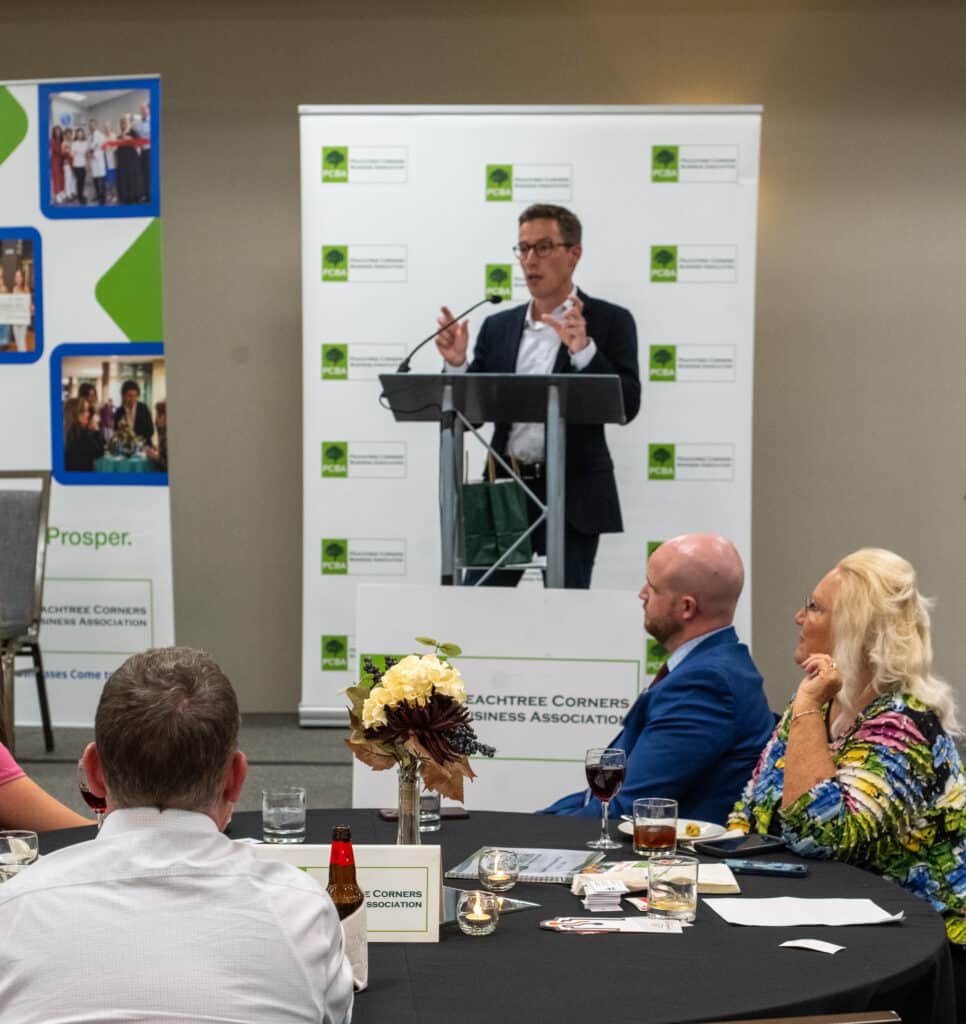
“The city started from a commercial, industrial, R&D base and then was expanded around it,” said Lapoire.
Though home to more than 42,000 residents, most of the jobs in Peachtree Corners are filled by people who live outside the city, he added.
“So we have this interesting mismatch, in a way, although not unusual,” said LaPoire. That creates traffic and transit issues. So that means that one of the solutions is to create more jobs here to fit the profile of the community.”
He presented charts that show professional services, consulting and engineering as the largest job categories. The next tier of businesses are wholesale and manufacturing.
“So we have a good mix of industry,” he said.
A five-year plan
The city has a five-year economic development plan (2023-2028) that outlines strategies for attracting and retaining businesses, with education and workforce development being key components.
Partnership Gwinnett has similar goals as Peachtree Corners, but on a larger scale.
“We are the county’s sales and marketing arm for all 17 cities now, and we receive funding from both municipal sources as well as existing businesses here — both in Gwinnett and outside of Gwinnett as well,” said Hickey.
He shared how Partnership Gwinnett is designed to drive a lot of major corporations toward doing business inside and with Gwinnett County.
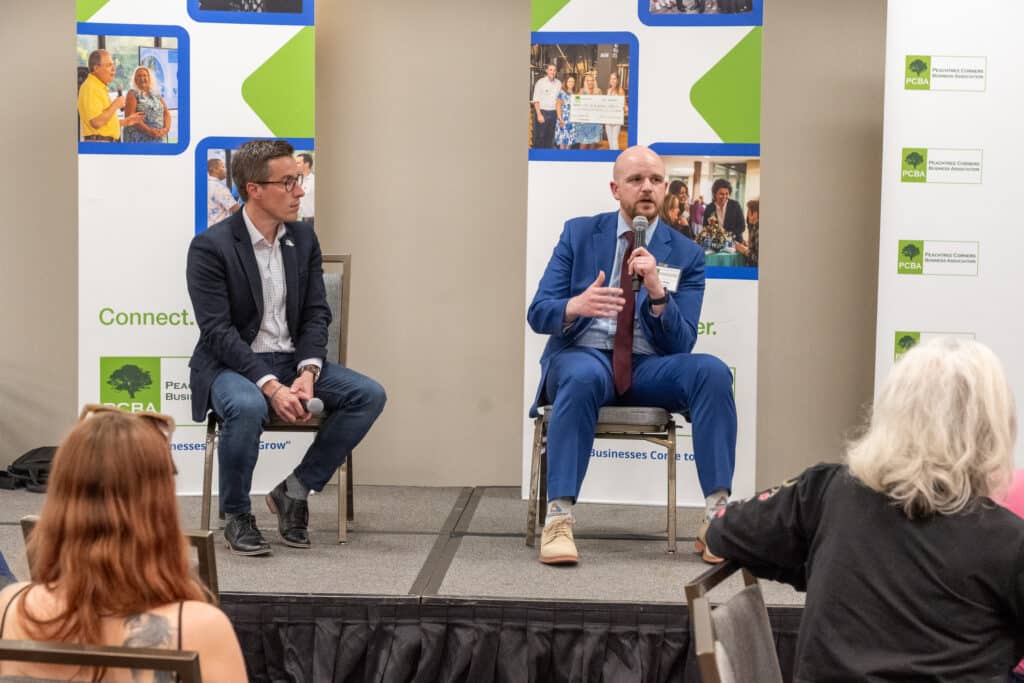
“One of the biggest things that we talk about that I’m sure it seems like most of us here, if you live here, you work here, you understand it. It’s the diversity that exists here in Gwinnett,” he said. “With a diversity index of 85, that means if we walk out of the Hilton here and we say hello to somebody, there’s an 85% chance they’re from a different ethnic or cultural background than ourselves, which to you and I may seem normal because that’s the life that we live in.”
He added that for companies, there’s a tremendous value in that, whether they have stated values, or they’re just making hiring decisions to get a wide range of candidates to fill those roles. Additionally, because of the proximity to Atlanta, Gwinnett County has a great labor draw.
Partnership Gwinnett
Partnership Gwinnett plays a significant role in recruiting businesses, expanding existing companies and developing the workforce. Hickey showed how the organization was involved with more than 24 projects last year.
“A majority of those were expansions, and that is a common thread you’ll see in economic development,” he said. “In business retention, expansion is so vital to working with our existing companies to make sure that they have the resources they need.”
He added that’s what leads to new investment and job creation in the community.
The organization also focuses on redevelopment projects, working with cities and the county to improve infrastructure and community amenities — especially strong educational institutions such Georgia Gwinnett College, Philadelphia College of Osteopathic Medicine and others.
Quality of life
In closing, both men stressed the importance of recruiting companies and developing the workforce, along with one aspect that means a lot but may not be as obvious — quality of life.
“It’s definitely evident that people like to work where they live — the whole live, work play experience,” said Hickey. “I joke that the part that people really have the most questions about, and are most excited to learn about, is new events at The Forum or Gwinnett Place Mall.”
Although they want to know what’s the next major company coming to Gwinnett, people REALLY want to know about how to spend their leisure time.
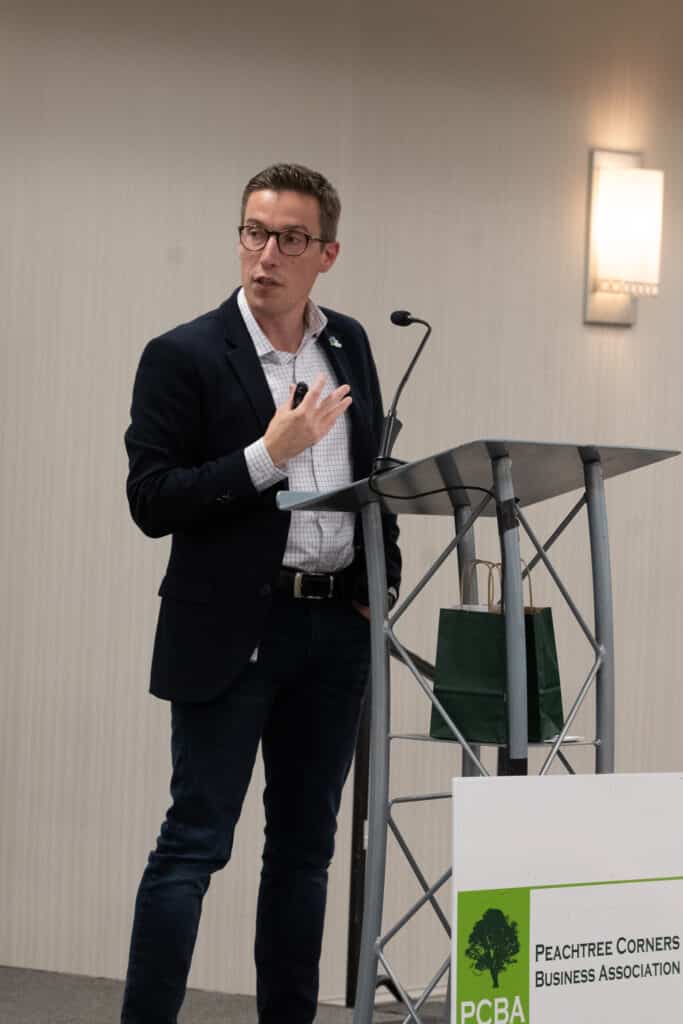
“That speaks to the importance of ensuring that we have a great community,” he said. “So at Partnership Gwinnett we work with all of our cities, and the county government as well, [on] a kind of a best-practices trip.”
He added that the peer tour allows everyone to know what the neighboring communities are doing and share the good news.
“We will take all of these elected officials, but also city staff, to different cities across the Southeast,” he said. “Last year, I believe they went to Huntsville, and have been to Greenville, Chattanooga — all cities that have done some really cool redevelopments that have taken their city to the next level. Our goal is to learn from them.”
Related
Business
Two Peachtree Corners Business Leaders Named Finalists for EY Entrepreneur Award
Published
3 weeks agoon
April 23, 2025
Ernst & Young’s Entrepreneur Of The Year celebrates ambitious entrepreneurs who are shaping the future
Ernst & Young LLP (EY US) recently announced the finalists for the prestigious Entrepreneur Of The Year 2025 Southeast Award, and two local, Peachtree Corners business leaders — David Quirk, president and CEO of DLB Associates Consulting Engineers PC and Erin Hanson, founder and CEO of Guardian Sports — made the list.
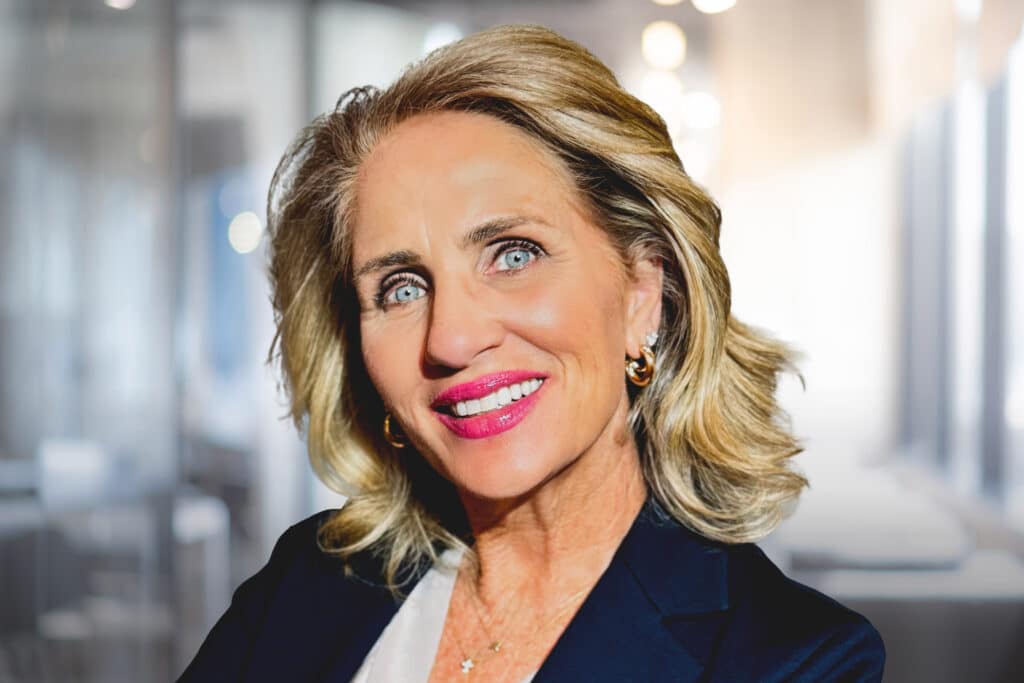
Hanson’s Guardian Sports is a family-owned company dedicated to serving athletes through safety and performance improvements in sports equipment. Major products include the Guardian Cap, PEARL ball and Guardian Infill serving the sports industry.
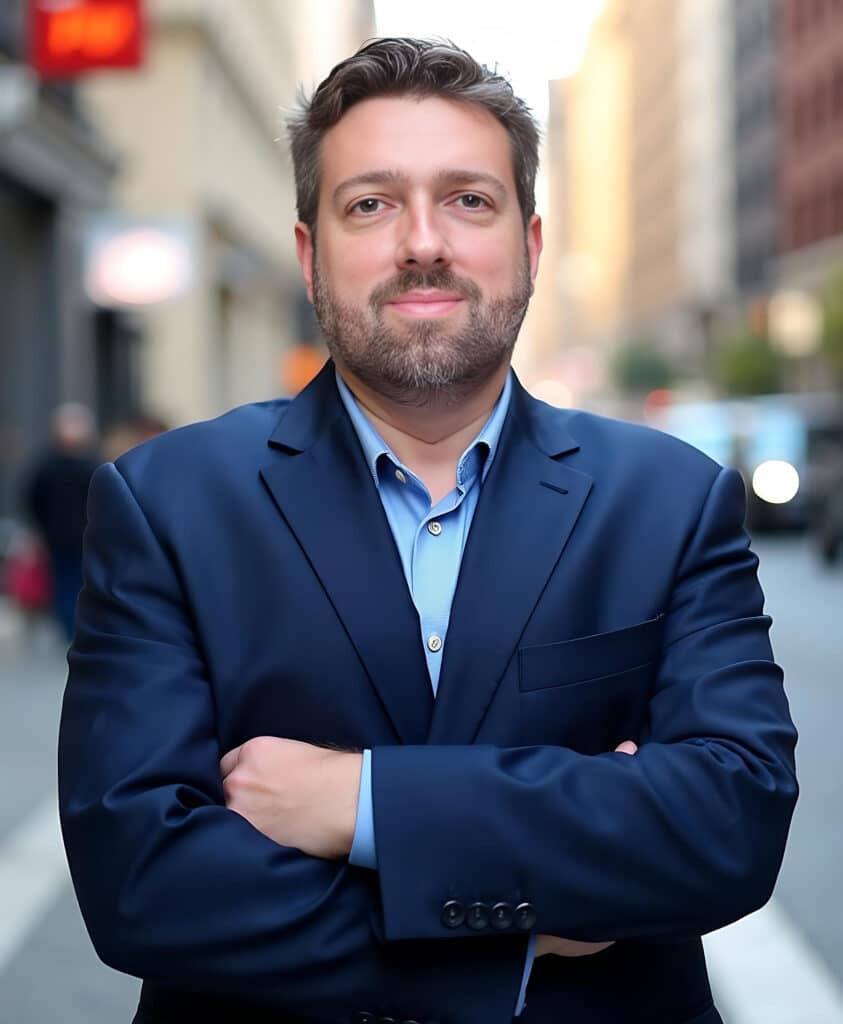
DLB Associates is a U.S.-based consulting engineering firm specializing in mission-critical and complex built environments. With more than 40 years of expertise, DLB delivers innovative, technology-driven solutions in engineering, commissioning and operations worldwide.
Celebrating entrepreneurial leaders
Now in its 40th year, Entrepreneur Of The Year recognizes the bold leaders who disrupt markets through the world’s most ground-breaking companies, revolutionizing industries and making a profound impact on communities. The program honors those entrepreneurs whose innovations shape the future and pave the way for a thriving economy and a hopeful tomorrow.
The Southeast program celebrates entrepreneurs from Alabama, Georgia, North Carolina, South Carolina and Tennessee.
An independent panel of judges selected 36 finalists for their entrepreneurial spirit, purpose, growth and lasting impact in building long-term value.
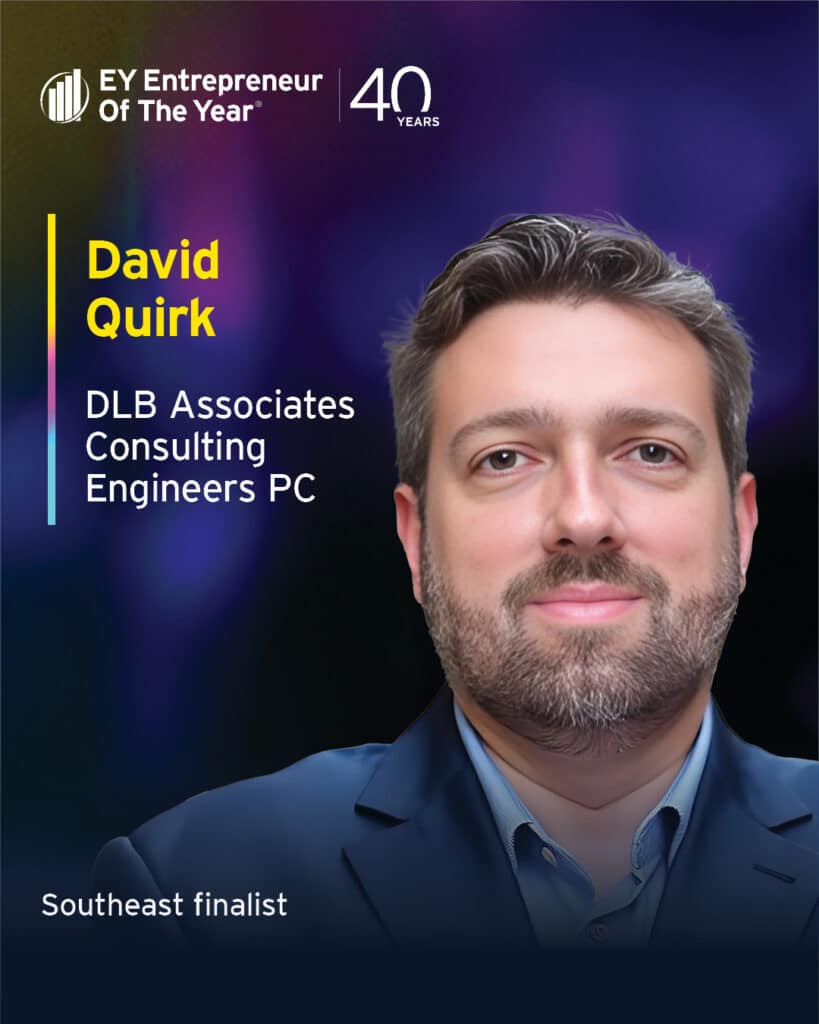
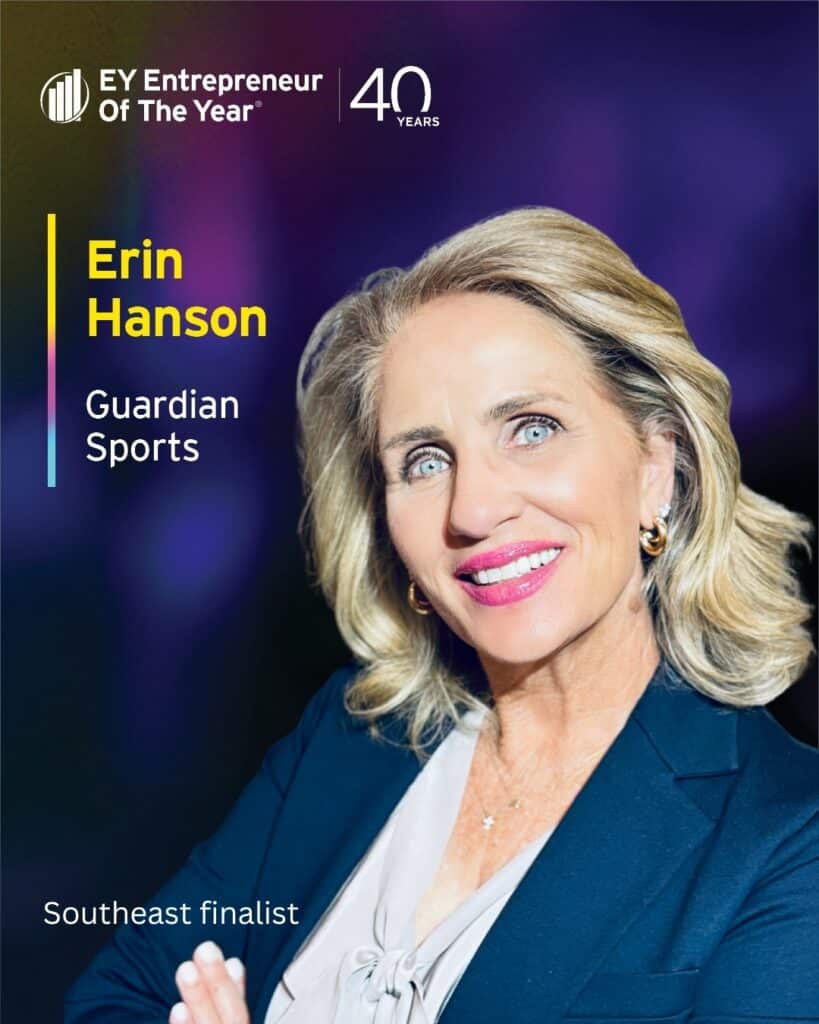
“This year’s finalists are leading examples of innovation, perseverance and resilience, illuminating paths to a brighter future for their industries and communities,” said Chevy Arnold, Entrepreneur Of The Year Southeast Program co-director.
“Their commitment to excellence transforms challenges into opportunities, inspiring us all,” added Kimberly Kicklighter, Entrepreneur Of The Year Southeast Program co-director.
Entrepreneur Of The Year honors many different types of business leaders for their ingenuity, courage and entrepreneurial spirit.
The program showcases original founders who bootstrapped their business from inception or who raised outside capital to grow their company; transformational CEOs who infused innovation into an existing organization to catapult its trajectory; and multigenerational family business leaders who reimagined a legacy business model to strengthen it for the future.
Including Quirk and Hanson, the 2025 Southeast finalists are:
- Marc Hodulich | 29029 | Atlanta, Georgia
- Damon Stafford | Alpine Intel | Charlotte, North Carolina
- Lou Hensley | Aspida | Durham, North Carolina
- Matthew Dent | Buffalo Rock Company | Birmingham, Alabama
- Melanie Little | Colonial Pipeline Company | Alpharetta, Georgia
- Will Bartholomew | D1 Training | Franklin, Tennessee
- Rene Diaz | Diaz Foods | Atlanta, Georgia
- David Quirk | DLB Associates Consulting Engineers PC | Peachtree Corners, Georgia
- Markus Scott | EyeQ Monitoring | Atlanta, Georgia
- Jon Gosier | FilmHedge | Atlanta, Georgia
- John Fitzpatrick | Force Marketing | Atlanta, Georgia
- Dr. Barry Patel | Galt Companies | Atlanta, Georgia
- Dr. Wade Smith | Galt Companies | Atlanta, Georgia
- Charles Gillespie | Gambling.com Group | Charlotte, North Carolina
- Kevin McCrystle | Gambling.com Group | Charlotte, North Carolina
- Mike Griffin | Griffin Brothers Companies | Cornelius, North Carolina
- Erin Hanson | Guardian Sports | Peachtree Corners, Georgia
- Dan Beem | Hissho Sushi | Charlotte, North Carolina
- Aaron Siegel | Home Team BBQ | Charleston, South Carolina
- Marc Murphy | Ignite Digital Services | Charleston, South Carolina
- Miller Chalk | Inglett & Stubbs, LLC | Mableton, Georgia
- Liza Rodewald | Instant Teams | Southern Pines, North Carolina
- Stephen Andresen | McClancy Foods & Flavors | Fort Mill, South Carolina
- Travis LeFever | Mission Mobile Medical Group | Greensboro, North Carolina
- Cyrus Mojdehi | Northway Homes | Charlotte, North Carolina
- Connor Ryan | NutraSky | Alpharetta, Georgia
- Fritz Owens | OTR Solutions | Roswell, Georgia
- Christopher Chuang | Relay, Inc. | Raleigh, North Carolina
- Kurt Jacobus | restor3d, Inc. | Durham, North Carolina
- Tom Kendrot | Shearwater Health | Nashville, Tennessee
- Teak Shore | Southern Lighting Source | Cumberland, Georgia
- Cindy Eckert | Sprout Pharmaceuticals | Raleigh, North Carolina
- Bryan Moore | TalkShopLive Inc. | Nashville, Tennessee
- Tina Moore | TalkShopLive Inc. | Nashville, Tennessee
- Igor Marinelli | Tractian | Atlanta, Georgia
- Joan Butters | Xsolis | Franklin, Tennessee
You can learn more about the finalists at ey.com/en_us/entrepreneur-of-the-year-us/southeast/winners-finalists.
Regional award winners will be announced on June 25 during a special celebration. The winners will then be considered by the national independent panel of judges for the Entrepreneur Of The Year National Awards, which will be presented in November at the annual Strategic Growth Forum®, one of the nation’s most prestigious gatherings of high-growth, market-leading companies.

About Entrepreneur Of The Year
Founded in 1986, Entrepreneur Of The Year has celebrated more than 11,000 ambitious visionaries who are leading successful, dynamic businesses in the U.S., and it has since expanded to nearly 60 countries globally.
The U.S. program consists of 17 regional programs whose panels of independent judges select the regional award winners every June. Those winners compete for national recognition at the Strategic Growth Forum® in November where national finalists and award winners are announced.
The overall national winner represents the U.S. at the EY World Entrepreneur Of The Year™ competition.
For more about the award, visit ey.com/us/eoy.
Related
Business
SCB Construction Group Partners with CGA Reps on New Peachtree Corners HQ
Published
4 weeks agoon
April 15, 2025
SCB Construction Group, freshly rebranded from SteelCo, secures construction project with CGA Reps for new office HQ in Peachtree Corners
SCB Construction Group has announced a strategic partnership with CGA Reps to build a new office headquarters in Peachtree Corners. The project, encompassing approximately 26,000 square feet of innovative workspace, marks a significant milestone in advancing CGA Reps’ corporate vision while showcasing SBA Construction Group’s commitment to delivering transformative construction solutions.
In collaboration with Oakley Real Estate Partners — serving as developers of the project on behalf of CGA Reps — this venture reflects a united effort to bring cutting-edge design (from Smallwood architecture firm) and operational excellence to the commercial kitchen equipment industry.
The announcement follows several high-profile projects for SCB Construction Group in 2024, including a 72,500-square-foot manufacturing center and headquarters for Process Equipment & Controls, an impressive interior build-out for Courtesy Ford Conyers’ commercial service center and the Phase 1 completion for StoreEase Loganville — recently honored as a 2024 Smart Facility of the Year by Modern Storage Media.
A bold new chapter for CGA Reps
The new 25,890-square-foot headquarters is designed to be more than just a workplace — it is envisioned as an inspiring environment that serves both client engagements and employee creativity. CGA Reps is recognized as an industry expert in commercial kitchen equipment, representing leading manufacturers, warehousing, distributing and installing everything from fryers to commercial walk-in freezers.
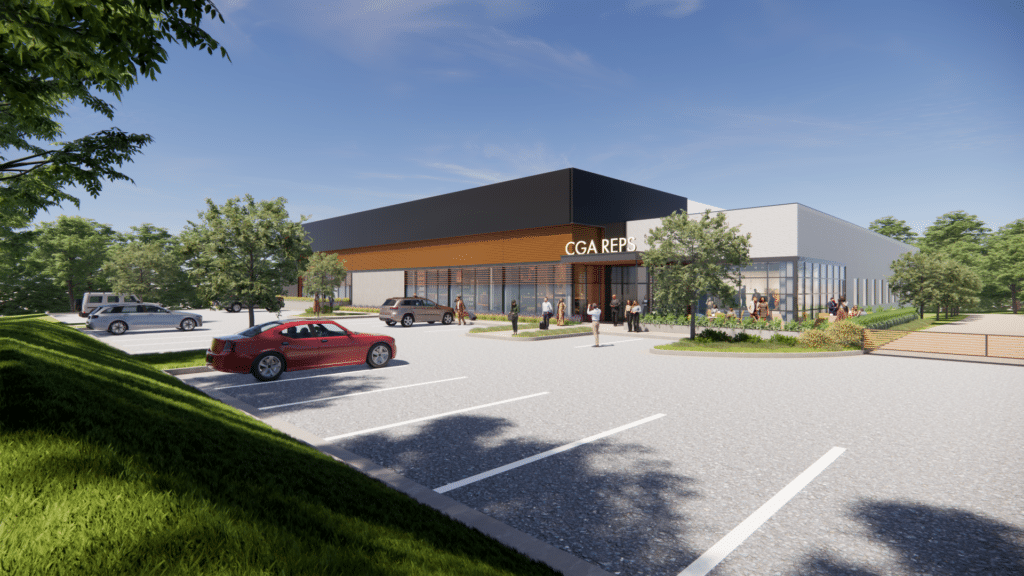
The facility’s design reflects this expertise, featuring a dedicated approximately 9,000-square-foot showroom kitchen that will host equipment demonstrations, tradeshows and webinars. This dynamic space will allow CGA Reps to showcase its comprehensive product range and provide clients with hands-on experiences of the latest commercial kitchen innovations.
A standout feature of the project is its innovative approach to stormwater management. With the site comprising only three acres, sufficient space for a traditional detention pond does not exist. To overcome this challenge, the design includes an underground detention system located beneath the truck court to efficiently handle all stormwater runoff.
This solution not only maximizes the use of the available land but also reinforces CGA Reps’ commitment to sustainable practices.
“We are excited to embark on this project with CGA Reps,” said Jay Bailey, CEO of SCB Construction Group. “This partnership underscores our commitment to customer excellence in design and construction, and it is a testament to the trust our clients place in our ability to deliver projects that not only meet but exceed expectations.”
Delivering excellence through proven expertise
SCB Construction Group’s track record in 2024 has been nothing short of remarkable. Earlier in the year, the company completed a 72,500 square foot manufacturing center for Process Equipment & Controls, integrating office space within a dynamic production facility.
This project was celebrated for its innovative design that balanced operational efficiency with a modern aesthetic, utilizing IMP panels to mimic tilt-up concrete, setting new standards for manufacturing environments.
Similarly, the interior build-out for Courtesy Ford Conyers’ commercial service center demonstrated SCB Construction Group’s ability to transform conventional spaces into functional and attractive environments that cater to both customer and staff needs.
The company’s commitment to quality and precision was again evident in the successful Phase 1 completion for StoreEase Loganville. This project, which recently earned the distinction of a 2024 Smart Facility of the Year by Modern Storage Media, highlights SCB Construction Group’s forward-thinking approach to construction and design, incorporating smart technologies and design that enhance sustainability and operational efficiency.
A rebranding that reflects a vision for the future
In a move that signals its evolution and growth, SCB Construction Group has recently rebranded from its former identity, SteelCo Buildings, as it spins off its construction division. This strategic rebranding is not merely cosmetic — it represents a renewed commitment to capabilities, credibility and client-focused service.
The refreshed brand is anchored by a new tagline “Deep Expertise, High Expectations” and a clear brand promise that communicates the company’s mission: to craft exceptional construction experiences based on precision, innovation and trust.
“Our rebranding is about more than just a new name or logo; it’s a renewed promise to our clients and communities,” explained Robert Lee, marketing director at SCB Construction Group. “We believe that our updated brand identity, including our invigorated tagline and mission statement, encapsulates our dedication to pushing the boundaries of design and construction. It reflects our commitment to creating spaces that are as inspiring as they are functional.”
Transforming spaces to inspire and connect
The new headquarters for CGA Reps is expected to become a landmark facility in Peachtree Corners. Beyond its impressive architectural design and advanced construction techniques, the building is planned as a hub for innovation and collaboration.
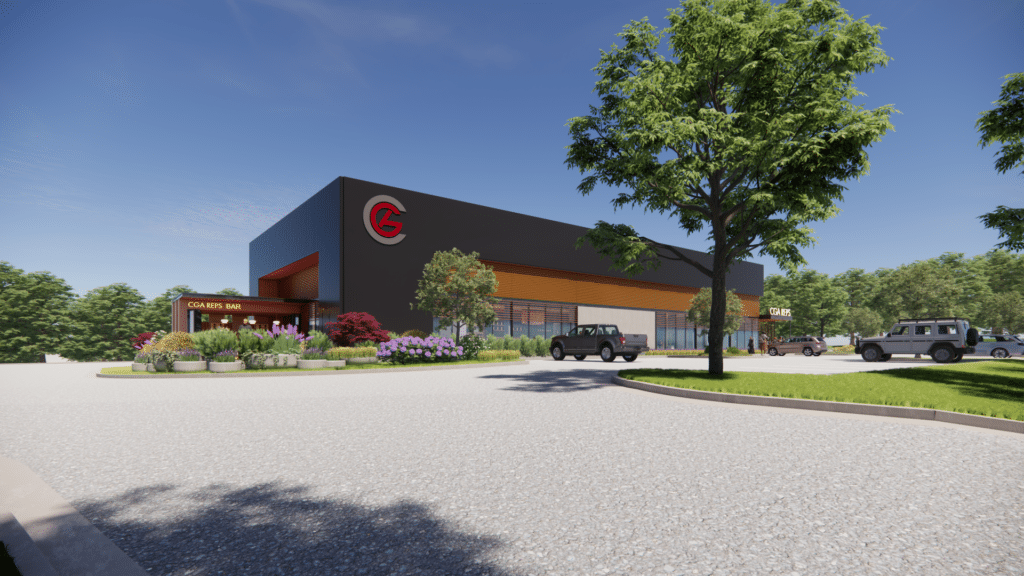
The interior build-out will include dynamic client reception areas, interactive meeting rooms, and dedicated spaces designed to foster creativity and teamwork among employees. The layout is crafted to ensure that every area of the facility contributes to a productive and inspiring work environment.
“By investing in this state-of-the-art facility, CGA Reps is making a strong statement about the future of work,” said Bryan Young, VP of construction at SCB Construction Group. “Our team is dedicated to designing and building spaces that not only serve the immediate needs of our clients but also create environments that motivate and inspire. The new headquarters will be a testament to that vision.”
Looking ahead
The partnership between SCB Construction Group and CGA Reps marks a significant step forward for both companies. As SCB Construction Group continues to build on its legacy of excellence and innovation, this project is poised to set a new benchmark for modern office headquarters design in the region.
With a strategic focus on creating spaces that inspire, connect and drive success, the future looks promising for both SCB Construction Group and its esteemed partner, CGA Reps.
For more information on the new headquarters project or to learn more about SCB Construction Group’s portfolio, visit scbcg.com.
Related
Read the Digital Edition
Subscribe
Keep Up With Peachtree Corners News
Join our mailing list to receive the latest news and updates from our team.
You have Successfully Subscribed!

Digital Edition

Official City Merchandise Line Debuts This Saturday at Town Green

Paul Duke STEM High School Student Earns CGO Scholarship

World Blood Donor Day Starts Here: Theo’s Miracle, Katherine’s Mission [Podcast]

Executive Function: A Tribute to Working Moms

Peachtree Corners Grows Business Opportunities Through Economic Development

Simpson Elementary Marks Exceptional Children’s Week

Peachtree Corners Hosts Discussion About the Future of Local Policing

Atlanta’s Dog Howl-O-Ween Festival Moving to Peachtree Corners for 2025

D1 Training Brings New Fitness Concept to Peachtree Corners

Peachtree Corners Hosts Discussion About the Future of Local Policing

City of Peachtree Corners Awarded Certificate of Achievement From GFOA for Seventh Straight Year

Simpson Elementary Marks Exceptional Children’s Week

Executive Function: A Tribute to Working Moms

Official City Merchandise Line Debuts This Saturday at Town Green

Peachtree Corners Grows Business Opportunities Through Economic Development

Light up the Corners [Video]

Capitalist Sage: Business Leadership in Your Community [Podcast]

Cliff Bramble: A Culinary Adventure through Italy

Top 10 Brunch Places in Gwinnett County

A Hunger for Hospitality

THE CORNERS EPISODE 3 – BLAXICAN PART 1

Top 10 Indoor Things To Do This Winter

The ED Hour: What it takes to Remove Barriers from Education







